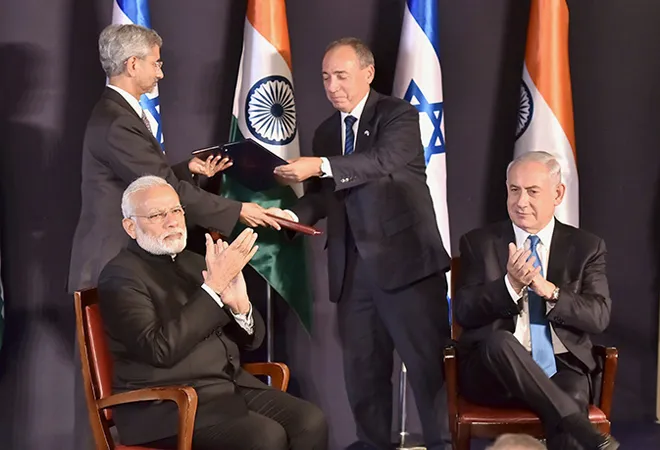Prime Minister Modi's visit to Israel is expected to witness the signing of a number of defence deals as New Delhi attempts to close the ever increasing military capability gap vis-à-vis China and Pakistan. The recent defence deals relating to the joint Indo-Israeli development of the Barak-8 air defence missile systems is reflective of India's efforts towards indigenous modernisation and fits in with Modi's "Make in India" initiative. The likely highlight of these deals will likely be India's purchase of armed drones in the form of the Heron TP for their perceived utility by the India media in conducting "surgical strikes".
Some of the likely deals that could be signed during the Prime Minister's visit also includes the purchase of 8,000 Spike anti-tank missiles, worth about $500 million for the Army and two Phalcon early warning, command and control systems for about a $1 billion for the Indian Air Force. The acquisition of these weapons systems hold the potential to address significant capability gabs in the Indian military.
India has been importing from Israel various weapons systems, missiles and unmanned aerial vehicles over the last few years, making India one of Israel's largest buyers of military hardware. The value of defence deals signed in recent months have exceeded $2 billion.
The Barak 8 surface to air missile capable of shooting down aircraft, drones or missiles upto a range of 70 kilometers has been developed by Israeli Aerospace Industries and India's Defense Research and Development Organization in collaboration with a number of other Indian and Israeli companies and vendors.
The Barak 8 being acquired for all the three services will reduce the number of types of air defence systems operated by the Indian armed forces. It will improve affordability by reducing acquisition, operating, integration, and training costs. More importantly, it vastly improves India's ground based air defence capability to defend its airspace from intrusions by the China or Pakistan when in the future it is paired with the longer range Russian-made S-400 Triumf advanced air defense systems. Given the IAF's claimed deficiencies in fighter airframes which would affect traditional roles like air defence and policing, air defence systems line the Barak-8 will play a critical role in defending Indian airspace.
The much vaunted Heron TPs are one of Israel Aerospace Industries' more advanced UAVs with an endurance upwards of 30 hours, maximum takeoff weight of 5,300 kg and a potential weapons/mission payload of upto 1,000 kgs. They can be used for both surveillance as well as combat and support roles, and can carry air-to-ground missiles to take out hostile targets.
The use of UAV's will permit Indian policymakers to exercise the use of force while substantially lowering the risk to military personnel and act as force multipliers in enhancing surveillance capabilities. In India's case, the Indian military hopes that armed UAV's will give it the capability to conduct symbolic retaliatory attack against Pakistan based terrorists in while limiting the violation of Pakistani sovereignty and hoping to avoid any escalatory spiral. The emphasis in the media the acquisition of the armed Heron TP for surgical strikes is indicative of how the ill-defined term has become the leading public and military understanding of military options available to India in responding to terrorism emanating Pakistan occupied Kashmir (PoK).
While there advanced technologies from Israel especially drones have captured the imagination of the military and public discourse offering the possibility of increasing India's offensive military capability, it is the technologically less complex system like the anti-tank missile in the form of the Spike that will transform the capabilities of the Indian infantry man who is the spear of a manpower intensive land based defence of two fronts.
So far, budgetary constraints have meant that the Indian armed forces have not been able to quickly invest in technologically advanced platforms to leapfrog their war fighting capabilities. India's burgeoning defence relationship with Israel provides New Delhi the opportunity to build some foundational military capabilities where Indian defence public sector companies have not succeeded in delivering even basic military platforms and systems.
This commentary originally appeared in News18.com.
The views expressed above belong to the author(s). ORF research and analyses now available on Telegram! Click here to access our curated content — blogs, longforms and interviews.




 PREV
PREV


